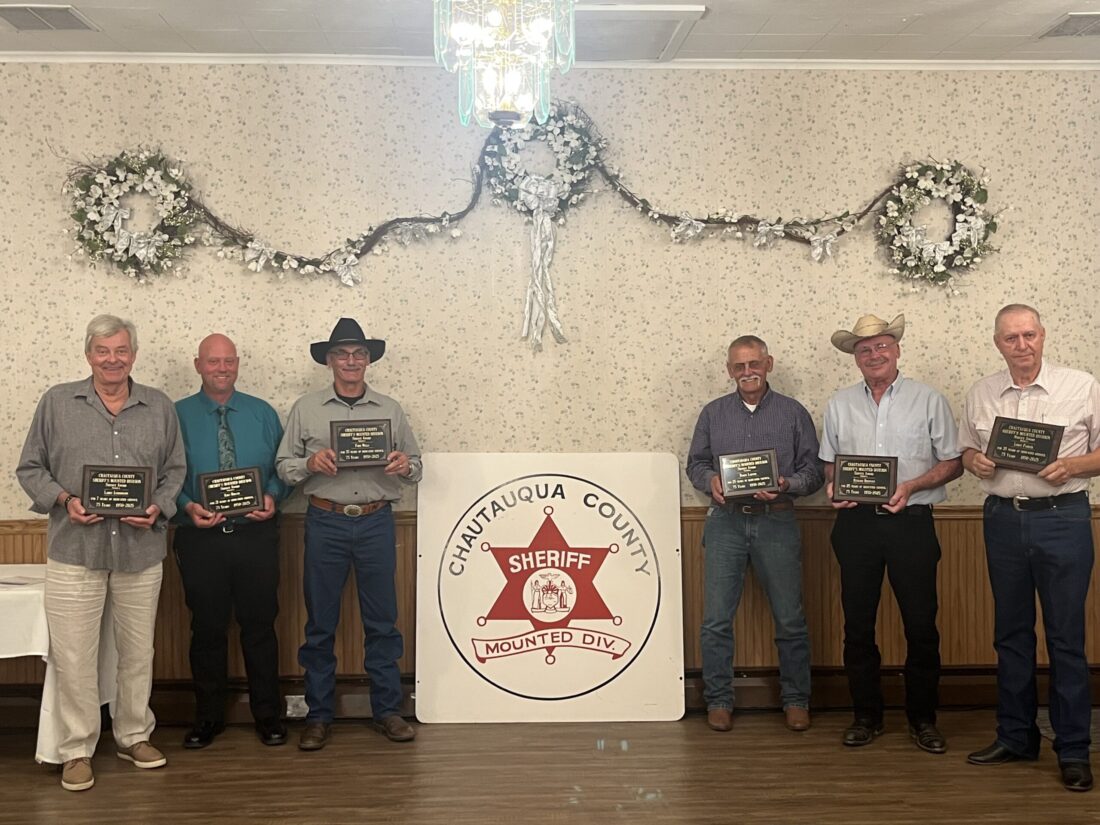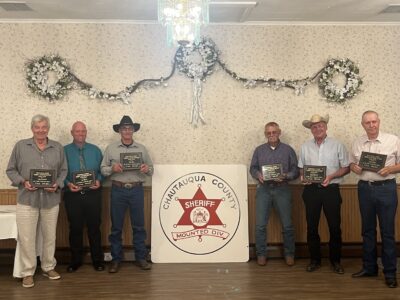Chautauqua County Sheriff’s Mounted Patrol retires after 75 years

Submitted Photo The final members of the Chautauqua County Sheriff’s Mounted Patrol Division were honored with plaques for their service. Pictured from left: Larry Ludemann, Pomfret; Kris Hirsch, Kiantone; Fred Wills, Pomfret; Barry Larson, Chautauqua; Richard Brennan, Hanover; Leroy Parker, Chautauqua. Not pictured: Frank Lauricella of Gerry.
Chautauqua County bid farewell to a law enforcement tradition Saturday night as the Sheriff’s Mounted Patrol Division retired after 75 years of service. The unit’s officers and horses, a familiar sight at parades and fairs, performed many duties over the years including search-and-rescue to crowd control, while serving as ambassadors for the sheriff’s department and building a lasting connection with the community.
Honoring active and retired officers were Chautauqua County Undersheriff Nathan P. Baidame, State Senator George Borello, Brian Abram representing Congressman Nick Langworthy’s office and Officer in Charge LeRoy Parker, who served as master of ceremonies for the evening’s celebration dinner.
The Mounted Patrol Division was established in 1950 by Sheriff Clarence D. Bell and Undersheriff Richard K. Monihan to provide traffic control, security, police escorts, and recovery assistance. Over the years, it had also been utilized for air accidents and search of lost cattle. According to Parker, officers on horseback had an advantage of greater visibility — both in spotting others and in being seen — as compared to patrols on foot or in vehicles.
In 1963, the Division was stationed at the Sterling Furniture Plant for four weeks during a labor strike between workers and management. Then in 1976, it was assigned to provide security at the Jamestown Airport for the arrival of the King of Sweden. On a later occasion, deputies assisted in the search for a missing child in the Fredonia area.
HIGH STANDARDS FOR OFFICERS AND HORSES
The county’s Mounted Patrol Division has long been a symbol of dedication, training, and teamwork between officers and their horses. But behind the pageantry of parades and public events lies a rigorous system of requirements that ensures both officers and their mounts are prepared for the demands of public safety.
A proclamation read by Senator Borrello characterized the Division as “an outstanding police agency, gaining the reputation of always being there and training to meet the highest standards.”
“Not possible,” he said, “if it were not for officers bringing their own highly trained animals and forming a partnership with their fellow deputies — reaching places inaccessible to vehicles or serving as a visible police presence in the community.”
“Every volunteer in our division is a certified sheriff’s deputy,” explained Officer Parker, who oversees the unit. “They don’t just show up on a horse. They must complete extensive law enforcement training, including pistol practice at the range, knowledge of the penal code, pressure point techniques, handcuffing, and annual qualifications on all law enforcement protocols.”
In the late 1970s, the state added mandatory horseback training, requiring each officer to master saddling and bridling, proper riding techniques, and emergency response while mounted.
“Handling a horse in a crowd or emergency situation is very different from riding on a trail,” Parker said. “You have to be completely confident in yourself and your horse.”
Horses themselves are held to exacting standards. Not every animal is suited for patrol duty.
“We look for a calm, stable temperament,” Parker said. “The horse has to trust its rider, tolerate sirens, helicopters, crowds, and other public situations without spooking.”
Training scenarios include police escorts, managing large gatherings at fairs, assisting ambulances in congested areas, and participating in parades.
Being part of the Mounted Patrol is also a personal investment. The county provides no stables, so officers house their horses on private property and cover all feeding, veterinary care, and equipment costs.
“That investment builds a bond between officer and horse that carries over to everything we do, on duty and off,” Parker noted. “Many deputies ride trails or compete in mounted shooting competitions with their patrol horses in their free time.”
The division retired its mounted patrol unit with seven active members and three working horses, a sharp decline from its peak of 25 members when the unit was founded in 1950. According to Parker, the retirement was largely due to the aging of current members and the difficulty of recruiting new volunteers, given the extensive and costly state-mandated training and liability requirements.
Addressing members and guests, County Executive Paul “PJ” Wendel, called the retirement “disappointing,” adding, “but its legacy of service and traditions speak volumes about your commitment.”
As part of the event, organizers presented a pictorial history of the Division’s 75 years, featuring members in search-and-rescue operations and at community events such as the Fourth of July parade and the Chautauqua County Fair.
Retired mounted patrol deputy Pete James shared a heartfelt thank you and reflected on the pride and sense of honor in being part of the division. “For me personally, the ability to wear the Chautauqua County sheriff’s badge for several years along with my spurs was indeed an honor and a privilege of my life,” he said.
James also acknowledged the crucial and often uncredited role that spouse and family members played in supporting the deputies, enabling them to fulfill their duties. “I can tell you that the families of mounted deputies deserve a lot of credit for helping us achieve our goals,” he said.
Parker presented a plaque to his wife, Kathy, honoring three generations of her family — her husband, father Bill, and grandfather George Frost — who all served in the Mounted Division, recognizing her support of the Division.
In the ceremony’s final moments, the division’s colors were retired, marking the official and permanent end of the 75-year-old unit. “With that, our unit was finished for good,” Parker said, bringing the evening to a solemn and reflective conclusion.
Patricia Pihl is a Personal Historian residing in Mayville.




